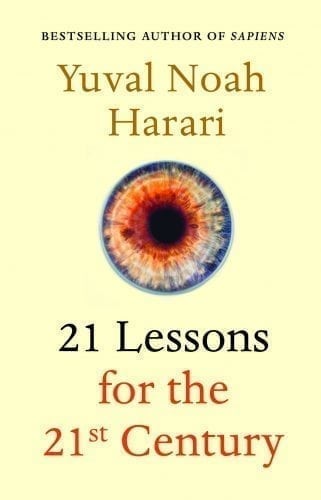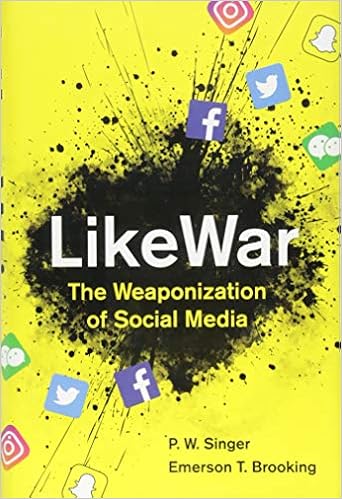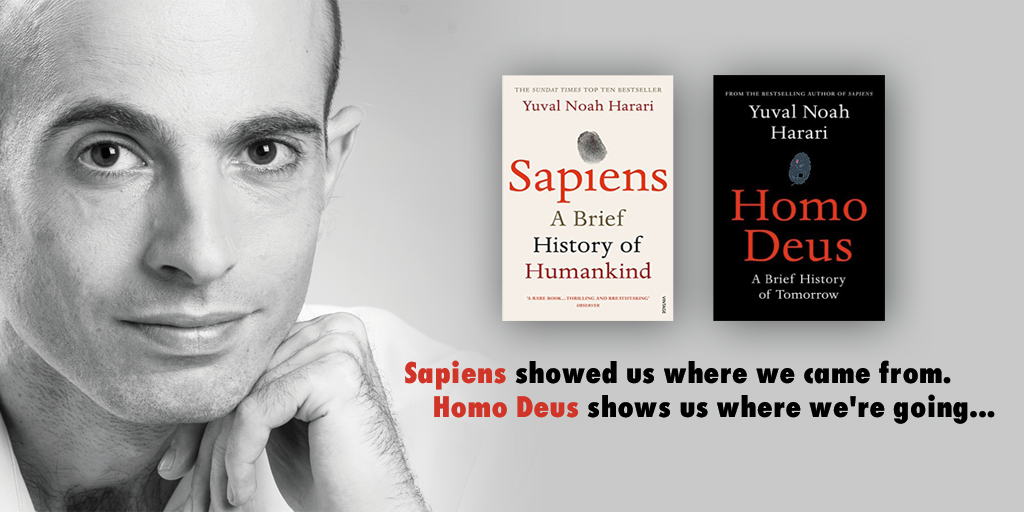
Right after doing my Greek this morning, I skipped some of my regular reading to get back to reading Harari’s 21 Lessons for the 21st Century. I ran across a reference to understanding the impact of infotech in this century. Harari used the phrase, “connectivity and updatability.” I recognized the idea of the huge impact of how connected and updatable a computer network is compared to a string of humans. For example, if there existed a world wide network of Artificiual Intelligence monitoring and dispensing medical help, it could be instantly updated when a new understanding occurs. The current model of humans on the other hand takes an incredible time to distribute new information and often fails to do so evenly. This all sounded familiar to me. Where had I heard about “connectivity and updatability” before?

I checked LikeWar by Singer and Brooking. Nope not there. I searched in my online bookmark service. Well, whatdoyouknow? There was a link to an article by Harari in the Atlantic.
Yuval Noah Harari on Why Technology Favors Tyranny – The Atlantic
Oh, that’s right. That’s where I got the idea to check out 21 Lessons for the 21st Century. It makes sense that ideas in the book seem familiar since the article was adapted from it.

Harari has written two previous books: Sapiens: A Brief History of Humankind and Homo Deus: A Brief History of Tomorrow. What attracts me about 21 Lessons is that his goal to shed light on what is happening right now in our world.
The first sentence in the book caught my attention: “Humans think in stories rather than in facts, numbers, or equations., and the simpler the story the better.” He says that in the 2oth century there were three competing global “stories”: Communism, Facism, and Liberalism. In the course of that century, Liberalism ends up sort of winning out. But now it is broken.
Harari explains the weird global shift to the right (including our very own Trumpland). He posits that some of these people are reasoning that maybe “maybe humans should abandon the very idea of a single global story.”
He continues in a helpful synopsis: “… [T]he vacuum left by the breakdown of liberalism is tentatively filed by nostalgic fantasies about some local golden past. Donald Trump coupled his calls for American isolationism with a promise to ‘Make America Great Again’—as if the United States of the 1980s or 1950s was a perfect society that Americans should somehow recreate in the twenty-first century. The Brexiteers dream of making Britain an independent power, as if they were still living in the days of Queen Victoria and as if ‘splendid isolation’ were a viable policy for the era of the internet and global warming. Chinese elites have rediscovered their native imperial and Confucian legacies as a supplement to or even substitute for the doubtful Marxist ideology they imported from the West. In Russia, Putin’s official vision is not to build a corrupt oligarchy but rather to resurrect the old tsarist empire. A century after the Bolshevik Revolution, Putin promises a return to ancient tsarist glories with an autocratic government buoyed by Russian nationalism and Orthodox piety spreading its might from the Baltic to the Caucasus.”
He continues: “Similar nostalgic dreams that mix nationalist attachment with religious traditions underpin regimes in India, Poland, Turkey, and numerous other countries.” He points out that no where are the fantasies more extreme than in the Middle East where Islamics want to turn the clock back 1400 years and are outdone by fundamentalist Jews in Israel who want to go back 2500 years.
I found this helpful. A couple pages later he addresses where this leaves us. “We are still in the nihilistic moment of disillusionment and anger, after people have lost faith in the old stories but before they have embraced a new one.” [SJ note: “Disillusionment” is the title of the first of the 21 sections in the book referring to the disillusionment of the failure of liberalism despite being the best story so far] “So what next? The first step is tone down the prophecies of doom and switch from panic mode to bewilderment. Panic is a form of hubris.”
Wow. That hit me hard. “It [panic] comes from the smug feeling that one knows exactly where the world is heading: down. Bewilderment is more humble and therefore more clear-sighted. Do you feel like running down the street crying, ‘The apocalypse is upon us’ ? Try telling yourself, ‘No, it’s not that. Truth is, I just don’t understand what’s going on in the world.”
This all helps me because I’m sure I don’t understand what is happening. It helps to think about adjusting my own sense of self from panic to bewilderment. chapter 12 (which is way ahead of me in the book) Humility: You are not the center of the world.
There’s lots more but I feel like I’m being a bit long winded for a blog post. I finished chapters 1 and 2 this morning, respectively “1. Disillusionment The End of History Has Been Postponed,” and “2. Work When You Grow Up, You Might Not Have a Job.” The next chapter is “Liberty Big Data Is Watching You.”

My copy of 100 Days of Real Food by Lisa Leake came in the mail recently. This morning I made Leake’s recipe for Whole Wheat Banana Pancakes (or Waffles). I followed her recipe closely except I substituted butter milk for regular mild in it. Yesterday I whipped up some of Lustig’s ranch dressing so it could sit over night. That’s why I had buttermilk in the house. Eileen and I had it on our midday salads. I thought it tasted great.
I like the idea of working on consuming as little processed food as possible.

My copy of Let The People Sing: Hymn Tunes in Perspective by Paul Westermeye arrived today in the mail. I seem to periodically return to reading about hymnody. I enjoy checking out the hymns I am called on to lead. Plus I am trying to understand great hymnody as poetry as well.
There is a box from Zingerman’s awaiting opening on the kitchen table. We were running low on balsamic vinegar and olive oil.
All this is to say that I continue to be spoiled.
Hope professors under investigation resign, students call for answers – The Holland Sentinel
Finally some information is being made public. This looks like a power play. I have intentionally asked friends of mine who are more on the inside to not tell me the gory details. Just yesterday, Jordan V. and I were decrying the wide spread use of inappropriate motivation tactics by music teachers we have witnessed. Although I must quickly add that both of us have had some splendid teachers who do not reflect upper education at its worst. I wonder if what has happened at Hope will ever become public. It doesn’t look very ethical on the part of the college. But what do I know?
Angela Davis ‘stunned’ by decision to rescind civil rights award – The Guardian
Ibram X. Kendi divides his first rate study on racisim, Stamped From the Beginning, into five sections each of which names an important figure in that period. They are Part I Cotton Mather, Part II Thomas Jefferson, Part III William Lloyd Garrison, Part IV W. E. Dubois, and Part V Angela Davis. She is actually a living treasure.
This link looks like original reporting. When I searched for Davis’s name on the New York Times web site, an AP article came up on this topic. Shameful.
Bewilderment- that’s brilliant, and does seem very true. As opposed to assuming we can see where this is going, add and the resulting hysteria all around us, bewilderment sound pretty refreshing!